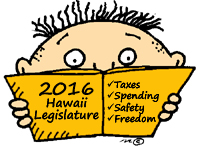2016 Hawaii Legislative Watch: Education
The 2016 Hawaii Legislative Session started on January 20. It’s hard to believe, but 2,658 bills are under consideration in the House of Representatives and 2,371 bills are up for debate in the Senate.
Last week, I highlighted bills that affect our taxes and our pocketbooks. This week, I’m focusing on bills that influence education in Hawaii. It would be impossible for me to read every bill in such a short time, so I’m relying on bill summaries to accurately reflect a bill’s intentions.
Here is an overview of the significant education bills being proposed in the 2016 Legislative Session. I’ve divided the bills into five sections: 7 proposals that should help students, 2 proposals that may hurt students, 6 proposals that could help teachers, 4 education proposals that increase the burden on taxpayers, and 2 proposals in which schools are taking over for parents. If I’ve missed any important bills, please let me know!
7 proposals that should help students:
- Fewer standardized tests, more instruction time. HB2730, SB2586, and SB2592 limit public school student participation in standardized tests and prohibit the use of standardized tests scores for evaluation purposes.
- Smaller classes, more teacher time. HB2732 and SB2597 establish maximum student enrollment per school class beginning in 2020.
- Money matters to high school students. HB1402 establishes the Hawaii Public Schools Financial Literacy Task Force. HB2442 creates a pilot project to create credit unions for high school students.
- Promoting good citizenship. HB857 and HB1122 require high school students to pass a civics test.
- Shaking it up in middle school. HB1436 requires public school students to take physical education and health education classes in grades 6, 7, and 8.
- Encouraging student innovation and invention. SB1278 establishes Makerspaces in public libraries. SB2010 establishes the Hawaii Project for Robotics Education.
- Voting rights for student board members. HB1200 and SB834 give voting rights to a student member of the Board of Education (BOE). SB820 increases the number of public school student representatives on the BOE from one to two.
2 proposals that may hurt students:
- Mandatory preschool (or is it really daycare?). SB2586 requires all eligible children to attend preschool by 2020.
- Tests, tests, and more tests. HB1159, HB1406 HD1, and SB1243 require the BOE to administer standardized tests early in the school year.
6 proposals that could help teachers:
- Classroom supplies reimbursements. HB13, SB821 SD1, SB2624, and SB2733 offer tax credit for school teachers of up to $500 for out-of-pocket classroom supplies.
- Housing vouchers for teachers. HB1016 HD1 and HB2510 create a housing voucher program for full-time classroom teachers.
- Teacher leader bonuses. HB1228 allows a $2,500 bonus to qualified “teacher leaders.”
- Student loan relief for teachers. SB1056 SD1 establishes an incentive program that provides for incremental loan repayment for teachers serving in high need areas of Hawaii for up to 10 years.
- Debit cards for classroom supplies. SB2593 allows public school teachers to use a debit card to purchase classroom supplies.
- Teachers take back your classrooms. HB1334 allows teachers to exclude from the classroom any student who engages in disruptive or threatening behavior.
4 proposals that increase the burden on taxpayers:
- Higher wholesale general excise (GE) tax. SB1317 increases the wholesale GE tax from 0.5% to 1.0% in 2016 and 2017 for infrastructure development and public schools.
- Higher retail GE tax. HB2731, HB2733, and SB2599 Increases the GE tax by 1% for DOE operations. HB1240 increases the GE tax by 0.25% to provide a dedicated funding source for the DOE. SB2586 increases the GE tax by an unspecified amount for public education.
- Higher property taxes. HB2065 and SB2292 authorize a surcharge on real property taxes to fund public school capital improvement projects.
- Is it preschool or taxpayer-funded daycare? HB1401 appropriates $17 million each year ($3.4 million to each of five preschool programs). HB1786 and SB2227 appropriate an unspecified amount for the Preschool Open Doors Program. HB1715 appropriates $6 million for the public prekindergarten program.
2 proposals in which schools are taking over for parents:
- Physical exams required for seventh grade. HB578 HD2 SD1, HB1948, and SB2387 require a child to have a physical exam prior to entering grade 7.
- HPV mandatory for seventh grade. HB1910 and SB2316 require a child to receive at least one dose of the Human Papillomavirus vaccine (HPV) prior to attending grade 7, beginning in 2017.
If you feel strongly about an issue, please speak up! Contact your state senator and representative by phone, mail, or email. Talk to your family, friends, co-workers, and neighbors. Write to a local newspaper or magazine.
Explore posts in the same categories: Education, GovernmentTags: 2016 Hawaii Education Bills, 2016 Hawaii Legislature, Hawaii Education Bills
You can comment below, or link to this permanent URL from your own site.
Leave a comment